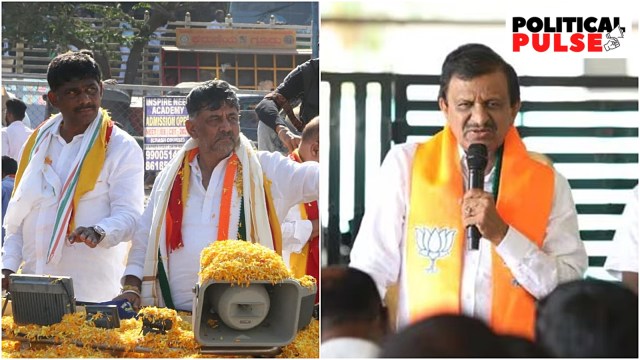It is the only one of Karnataka’s 28 constituencies that the Congress won in the 2019 Lok Sabha elections. This time, the Bangalore Rural constituency in the heart of the state’s agricultural hub is set to witness a high-profile battle between two of the most influential Vokkaliga families — the DK brothers and the Deve Gowda family — even as the BJP-JD(S) faces a tough test.

Formerly known as Kanakapura, Bangalore Rural will see the Congress’s incumbent MP D K Suresh, the brother of Deputy Chief Minister D K Shivakumar, lock horns with renowned cardiologist C N Manjunath who is the son-in-law of former Prime Minister H D Deve Gowda and is contesting on a BJP ticket.
Story continues below this ad
In 2009, the first election after the 2008 delimitation, the Bangalore Rural seat was won by Deve Gowda’s son and former CM H D Kumaraswamy. Suresh won the constituency in a bypoll in 2013 and retained it in 2014 and 2019, with a vote share of over 44% and 54% respectively. The DK Brothers dealt another blow to the JD(S) first family in last year’s Assembly polls when Congress candidate Iqbal Hussain defeated Kumaraswamy’s son Nikhil by more than 10,000 votes in the Ramanagara Assembly segment that had been with the “JD(S)’s first family” since 2004.
Apart from Ramanagara, the Congress holds Anekal, Kunigal, Magadi and Kanakapura Assembly segments while the BJP has MLAs in the Rajarajeshwarinagar and Bangalore South seats. The JD(S) holds the Channapatna Assembly constituency. The three seats with the BJP-JD(S) alliance account for 50% of Bangalore Rural’s voters.
While the BJP is banking on Prime Minister Narendra Modi’s popularity in the three urban segments of Bangalore South, Rajarajeshwarinagar, and Anekal, the party is hoping for the JD(S) to deliver in the remaining rural segments. Manjunath’s medical service in rural pockets is also being seen as a factor that could work in the alliance’s favour.
“I had taken my father for a consultation and was amazed by the changes that Manjunath’s hospital has undergone. Given his administrative skills and down-to-earth approach, he should be given a chance,” said Chandan, a 27-year-old resident of Channapatna.
Story continues below this ad
The alliance, however, has to deal with the defection of taluk-level JD(S) leaders. Ramanagara JD(S) taluk president Rajashekar, who had been associated with the party for over 20 years, recently crossed over to the Congress. Earlier this month, nine JD(S) leaders shifted to the grand old party, welcomed by Shivakumar at his Sadashivnagar residence. The JD(S) downplayed the defections saying that voters’ decision will not be influenced by it. “Only the first, second and third-rung leaders defect. This will not impact voters as they have already decided whom to vote for. It may impact only about 5% of the voters,” said a party leader.
The BJP and JD(S) joined hands following their drubbing in last year’s Assembly polls, where the JD(S) was reduced to 19 seats from the 37 it won five years earlier, faring poorly even in its strongholds of Hassan, Mandya, Ramanagara and Mysuru.
The BJP, which is seen to have a traditional voter base among the Lingayats – one of the two dominant caste groups in the state – with the alliance is hoping to make inroads into the votes of the Vokkaliga community, which has traditionally favoured the JD(S) but is seen to be consolidating in favour of the Congress since the Assembly elections.
Meanwhile, Suresh, who is seen as an MP “working like a gram panchayat leader” and is seeking a fourth term, is banking on his track record of helping people of his constituency during the Covid-19 pandemic and addressing the agrarian crisis. His party is also seeking votes based on the Siddaramaiah government’s five poll guarantees, whose beneficiaries are largely in the rural pockets of the state.
Story continues below this ad
A section of Congress leaders believes that the defections will be a shot in the arm for the party. “It (defections) will yield political dividends and translate into votes for us. While most leaders join due to ideological differences, many others join as they want to get panchayat and taluk-level issues addressed through the ruling party,” said a local party leader.
Voters in the constituency seem divided on their preference. While a section of the electorate said Ramanagara MLA Hussain had helped people in need and issues such as the Uniform Civil Code (UCC), Ram Temple, and abrogation of Article 370 were unlikely to have a bearing on the poll outcome, a few others felt the Congress’s five guarantees were “shortsighted”.
Local factors too seem to play on the voters’ minds in the constituency. “The MP has addressed local issues even as the state government’s free bus scheme has made life miserable. Buses are more crowded and their frequency has greatly reduced. Also we realise that all these schemes will not be in effect for an indefinite period,” Vasanta, a homemaker and a native of Magadi said.
However, a silk farmer from Ramanagara, Ramalingaiah, claimed the Congress did nothing to address their issues. “The temperature now is not conducive for silk farming. The government’s inaction is detrimental to the community,” he said.

































